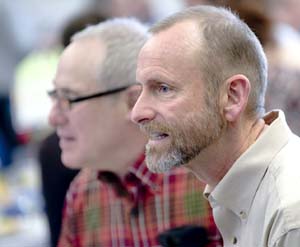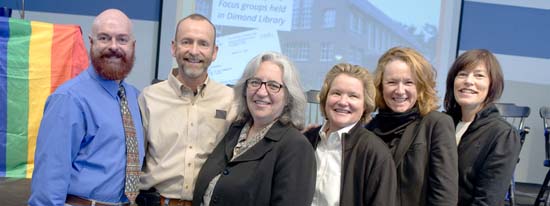 |
 |
| current issue |  | past issues |  | send a letter/news |  | address update |  | advertise |  | about us |  | alumni home |
Web Extras
Out Front, Full CirclePage 2 of 2
Given what happened back then—a governor who repeatedly called them perverts, front-page headlines urging "Boot Out the Pansies," the university's lawyer arguing in court that homosexuals had a "communicable mental illness" and thus should not be allowed to hold social events on campus—the audience might have expected the speakers to remember their Durham years as torture.
Instead, looking around at the living display of their legacy, here's what they remembered:
 Wayne April '74, right. |
Arguedas: "This was not some painful struggle for us. This was fun, and we knew we were right, and we had each other."
Philbin: "We were kids, and then this happened to us. From then on, it determined how we were going to be: We were going to question authority, do the right thing, stay out and never go back into the closet."
Maxfield: "We just didn't take no for an answer; we kept pushing the boundaries."
Baran: "You feel clearly when an injustice is being done. It's a very strong motivating force, and that's as true now as it ever was."
Dan Innis, dean of the Whittemore School of Business, said he'd recently heard a student comment that nothing much had changed in 40 years, that the same battles remain to be fought today.
"In the 1970s, we were asked to speak in psychology classes - but only abnormal psychology," Arguedas responded. "And you guys are getting married!"
After the breakfast, Innis said the students had come away with a new appreciation of life in 2012. "In the social media age, the power of one can be hard to recognize," he said. "They saw the impact that the actions of just a few people can have in helping to shape change."
When the pancakes were gone and the well-wishers had dispersed, a group of students and Ellen Semran, the university's full-time LGBTQ program coordinator, wandered with the alumni down the hall to the Strafford Room, where their 1973 dance had attracted more gawkers and reporters than dancers.
After they'd argued good-naturedly over what happened that night ("Kool and the Gang played," someone said. "They did not; we had records!"), the alumni asked Semran and the students to tell them about Safe Zones and all the other programs that support gay life on campus today.
They listened in amazed appreciation. "You guys are the best legacy handlers," Philbin told the group.
"I was totally impressed," Arguedas said later. "They are the front lines, they are doing it excellently, and they have significant help from their allies - not just good wishes but concrete help. Amazing."
The whirlwind seacoast trip allowed some time to revisit the fun stuff, too. The day before the breakfast, Philbin, Arguedas and Baran knocked on the door of the house where they'd lived in Dover, and the owners let them in to look around.
 REUNITED: From left, Richard Maxfield '75, Wayne April '74, Roma Baran '74G, Cris Arguedas '75, Ann Philbin '76 and Colleen McDonough '74. |
The memories still lived there—not just gay rights and women's rights meetings in the living room, but the stuff of which everyone's college years are made: Maxfield's cat playing with Baran's dog. Cooking big communal dinners. Classical music playing on Sunday mornings, and Arguedas yelling down from the third floor: "NO CHURCH MUSIC!"
Their personal memories had met the public memory, and finally the circle has closed. Today's activists stand on the shoulders of the'70s, and for one intense day, their forbears were privileged to experience the world they'd help create.
The last word goes to the first activist, Wayne April: "I feel very validated. I know some people look at that time as a dark period, but I don't. There is no stronger tonic than personal liberation. Today's activists have no fear—and that's the real legacy."
Jane Harrigan was a journalism professor at UNH for 23 years and is now a book editor.
Page: < Previous 1 2
Easy to print version
blog comments powered by Disqus

